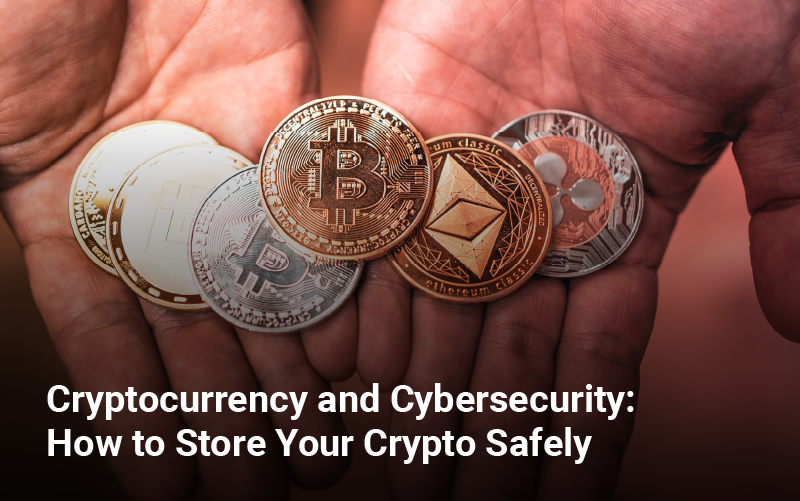Cryptocurrency has achieved enormous popularity over the years, but with the digital gold rush comes the need for robust security measures. Protecting your digital assets from hackers, scams, and theft is paramount.
Cryptocurrency and cybersecurity are intricately linked in the digital age. Cryptocurrency, such as Bitcoin and Ethereum, relies on blockchain technology, a decentralized ledger that documents all trades. While cryptocurrencies offer numerous benefits, including financial inclusion and efficient cross-border transactions, they pose significant cybersecurity challenges. The decentralized character of blockchain makes it immune to tampering, but the digital wallets and exchanges used to buy, store, and trade cryptocurrencies are susceptible to cyber attacks.
Cyber criminals often target these platforms to steal funds, exploit vulnerabilities, or engage in fraud. As a result, robust cybersecurity measures, including secure wallet management, strong authentication, and encryption techniques, are essential to safeguarding the integrity and security of cryptocurrency transactions and investments. The ongoing evolution of cryptocurrency and cybersecurity technologies highlight the constant cat-and-mouse game between innovators and malicious actors in the digital financial landscape.
This blog will highlight the most reasonable techniques for safely storing your cryptocurrency.
Best Practices to Protect Your Cryptocurrency
Let’s look at some of the best techniques and tips that can help you store cryptocurrency efficiently:
- Choose the Right Wallet: The first step in safeguarding your crypto is selecting the appropriate wallet. There are two main types to consider:
- Hot Wallets: These are online wallets connected to the internet, making them convenient for daily transactions but more vulnerable to hacking.
- Cold Wallets: Cold wallets, such as hardware wallets and paper wallets, store your assets offline, providing a higher level of security.
- Hardware Wallets for Maximum Security: If security is your top priority, a hardware wallet is your best bet. Popular options include Ledger Nano S, Ledger Nano X, and Trezor. These physical devices hold your private keys offline, ensuring protection even if your computer is compromised. To prevent physical theft, store your hardware wallet in a secure location, like a bank vault or a home safe.
- Consider Paper Wallets: A paper wallet is an offline solution for securely storing cryptocurrency. It involves generating a document that contains your public and private keys. While paper wallets are immune to online hacking, they can be lost or damaged if not handled carefully. Always make multiple copies and store them in different secure locations.
- Strengthen Your Passwords: Ensure your exchange accounts and online wallets have strong, unique passwords. A password manager can help generate and securely store complex passwords, reducing the risk of unauthorized access.
- Implement Two-Factor Authentication (2FA): Enable 2FA wherever possible, especially for your exchange accounts. This offers an additional level of security by mandating a second authentication approach, such as a text message or app-generated code, in addition to your password.
- Beware of Phishing Scams: Stay vigilant against phishing attempts. Cyber criminals may use fake emails, websites, or social media messages to trick you into revealing sensitive information. Always verify the legitimacy of sources before taking any action.
- Keep Software Updated: Regularly update your computer, smartphone, and cryptocurrency wallet software. Updates often incorporate security patches that manage susceptibilities.
- Safeguard Your Private Keys: Your private keys are the keys to your cryptocurrency kingdom. Never share them with anyone, and avoid storing them online or in easily accessible locations.
- Backup Your Wallet: Regular backups are essential whether you use a hardware or software wallet. Store these backups in multiple secure locations to prevent data loss.
- Diversify Your Storage: Don’t keep all your cryptocurrency in one place. Utilize a combination of hardware wallets, paper wallets, and exchanges for liquidity while keeping most of your assets in cold storage.
- Stay Current: The cryptocurrency landscape constantly evolves, with new security threats emerging regularly. Stay informed about the projects you invest in and educate yourself about the latest security best practices.
- Consider Multisignature Wallets: Multisignature wallets require multiple private keys to authorize transactions, adding an extra layer of security through redundancy.
- Limit Exposure: Only store the cryptocurrency you need for everyday transactions in hot wallets. Keep the rest in cold storage to minimize risk.
- Plan for Inheritance: In case of unforeseen circumstances, ensure your loved ones can access your cryptocurrency. Consider creating a clear plan or using a crypto inheritance service.
- Secure Your Network: Your internet connection should be secure, and you should use a reliable, up-to-date antivirus program to protect against malware and phishing attempts.
Securing your cryptocurrency is a multi-faceted process that demands attention to detail and vigilance. By following these fair practices and staying informed, you can safeguard your digital assets. Keep adapting your security practices to avoid potential threats as the crypto space evolves.
How Can EC-Council University Help With This?
In the ever-evolving landscape of cryptocurrency and cybersecurity, staying ahead of potential threats is essential. It’s a dynamic journey that requires continuous education and adaptation. To further enhance your knowledge and expertise in the field of cybersecurity, consider exploring cybersecurity degree programs offered by institutions like EC-Council University. They provide valuable opportunities to deepen your understanding and earn qualifications that make a real difference in securing your digital assets. By combining these educational resources with the best practices outlined above, you can confidently navigate the exciting world of cryptocurrencies while safeguarding your investments and personal information.








